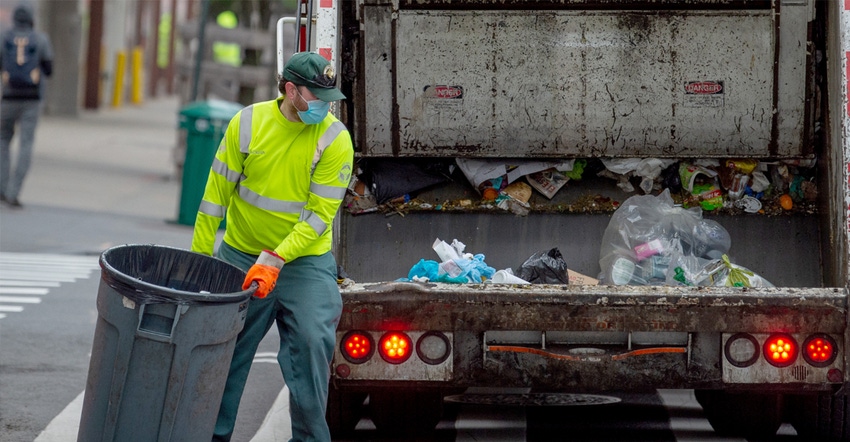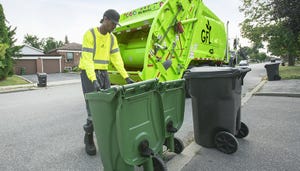How Waste Companies are Redefining Safety in a COVID-19 World and Beyond

The ongoing pandemic has made companies across the globe redefine what it means to keep workers safe.
With solid waste and recycling collection ranking fifth in the top ten deadliest occupations in the United States according to the Bureau of Labor Statistics, it’s no surprise that safety is the “single most important subject in our entire industry,” Will Flower, Vice President, Corporate & Public Affairs at Winters Bros., began in a WasteExpo Together Online session.
“Re-Imagine Your Safety Program in the COVID19 World” examined the challenges stakeholders within the industry have when it comes to preventing COVID-related occupational illness while maintaining a robust safety program focused on achieving compliance, eliminating hazards and preventing illnesses and injuries. And a thriving safety culture begins with buy-in and engagement from the C-suite down to the sanitation worker in the field.
The session included insight from whom Flower referred to as three of the “most dedicated, knowledgeable and professional individuals in the entire solid waste and recycling industry:”
Shawn Mandel, Vice President, Safety & Risk, Waste Connections, Inc.
Jeff Martin, Vice President, Waste Management, Inc.
Jim Olsen, Vice President, Republic Services, Inc.
While COVID-19 spread throughout the United States and the globe at an “amazing” speed, what was more amazing, Flower said, was the industry’s response to maintain the U.S. infrastructure and ensure waste management systems remained fully functional.
“While we were all very essential workers to keep the society clean and healthy, we were dealing with huge increase in the amount of waste that was generated at homes,” he continued. “We adjusted. We managed quickly to a shrinking commercial customer base, but like we do in all types of crisis situations, this industry did what was necessary to ensure society was safe.”
He commended sanitation workers as “frontline heroes” and asked the panelists about how the novel coronavirus is changing safety in the industry.
On Morning Huddles…
Flower first inquired about morning huddles, a practice typically completed throughout various industries to discuss relevant daily topics and changes/adjustments in safety measures. If these group meetings could not be completed, he asked, how can workers communicate with one another?
Shawn Mandel: We’re using some precautions to ensure that our folks are safe. At the same time, we had to continue to engage our people. We had to continue to further our culture and ensure that those leadership frontline team member relationships continued. They look slightly different. There’s more safe distancing, certainly masks are incorporated as appropriate or facial coverings. We’re taking those precautions as directed by the CDC and public health officials. But [morning huddles] were something that we knew just had to continue. We knew we could not lose the relationships with our frontline team members if we were going to get through this thing.
Jim Olsen: They’re so critical to our operations and to the success we have out on the street every day, in our shops and our recycling facilities. What we did was move them outside to the point where we were having drive-in movies. We showed a lot of video clips to our drivers to help them understand what we expect of them. We had a lot of our facilities show [training videos] outside so we could have plenty of social distancing. Quite frankly, that’s been a positive change. In some divisions, it gets a little bit same old-same old and one positive side was moving everything outside for people to be more creative and have better conversations with their people and keep the group smaller. We’re going to move forward doing it past COVID the way we’re doing it today just because it seems to be more efficient and it works better.
On Pandemic Response Plans…
While many companies have basic illness prevention plans or enact business continuity measures, the pandemic threw many for a loop and disrupted many industries.
“Looking back one year, Flower asked, “did you have a pandemic response plan in place and if so, how did you use that plan?”
Jeff Martin: I think a lot of people underestimate the industry. A lot of people don’t realize a lot of the companies do have pandemic response plans that really go back to the early 2000s with the original SARs and H1N1 in 2009. While we rely on the CDC, NWRA and other experts to modify these plans accordingly, especially our business continuity plans, it’s not only a matter of these plans being in place but then being resurrected and modified accordingly so that we can respond. That really led the first steps that we took, and a number of those the other companies took. We have a lot of changes. The people have changed. The processes have changed. The equipment in some cases has changed. Customer expectations have changed. We had to change with it, so those business continuity plans had to change. The first thing we did after the pandemic, we had to make sure we had a COVID-19 response plan in place. These are functional leaders by department who are responsible going forward. Number two was, and probably most importantly, was alignment with our SLT – our expectations, their daily briefings, our assurance and guidance. The other thing that we had to have was a single channel of communication. We could not have various people with various messages, so we streamlined that, and that worked exceptionally well. And finally, continuing to massage those business continuity plans.
On the Biggest Challenges…
The industry had to adjust to the evolving situation, and many companies met some obstacles along the way. Flower wanted to know what the biggest challenges were and how the panelists overcame them.
Shawn Mandel: I think the biggest challenge was just ensuring that our folks were adhering to the precautions necessary. If you have a 50-truck operation with 60 or 75 employees, can imagine that this pandemic could have very easily wiped out a district that size in a manner of a week. Just ensuring that our leaders understood the level of importance and emphasis that they needed to put on the precautions and making sure our folks were not only watching out for themselves, they were watching out for their fellow team members and for that matter their loved ones at home. The last thing that we wanted was somebody contracting this virus and taking it home to someone on that critical list. I wouldn’t say we overeducated, but we overeducated. We were constantly communicating, whether it be through videos, through our internal network, through our leaders and tailgate meetings and kick-off meetings and so forth. We just wanted to make sure our folks had all the information, realizing that knowledge is power.
Jim Olsen: I would say its supplies. We’re pretty fortunate. We have a robust field procurement program and they helped direct and find local suppliers – hand sanitizer was a great example. I think everybody remembers back to when you couldn’t find it on shelves at the grocery store. That’s when we saw small breweries switch gears and start to produce hand sanitizer. Our procurement department was on top of that, so we were never short ourselves but there’s no doubt there were some stressful moments. The reason I mention hand sanitizer specifically is because that’s still an ongoing activity with our procurement group not because of availability but because of quality. One of the things that NWRA just recently put out is there are sanitizers that are toxic, and FDA does not approve hand sanitizers, but you’ll actually see products that say FDA approved. If you see that, you shouldn’t use those. There’s a lot of education that’s ongoing. I think you need to continue to do that too because some of these issues continue to be challenges such as hand sanitizer and using a safe product.
On Getting Employee Buy-In…
Even if a company has a written safety plan, eliminating new hazards could mean making frequent adjustments and updates.
Flower then asked Martin, “What did you find to be most effective in terms of getting people in the field to understand and buy into these new procedures?”
Jeff Martin: I think being frank with your employees and upfront and answering the questions they most commonly had. The alignment with the functional leaders of our departments first and foremost with a company of our size was critically important – the alignment with our senior leadership. Then the channel of communication throughout our communications department whether it was videos or frequently asked questions or whether it was a simple memo from John Morris or Jim Fish. They were relevant to the audience whether it was the frontline workers and they had concerns about handling waste, or it was about sales and visiting customers to solve issues. It was relevant to our employees. One of the other biggest things was quickly realizing it was far more important than just our employees – we were now worried about our extended families.
On Long-Term Changes in Safety…
Shawn Mandel: Some of those long-term plans are pretty simple. In talking with some of the other professionals in the industry, it was kind of a head-smack moment. We said to ourselves, “why haven’t we had things like hand sanitizers and those type of hygiene things supplied in the cabs of our trucks.” I know we at Waste Connections didn’t. We’ve got first-aid kits. We’ve got triangles. We have all of these things, but we don’t have some basic hygiene supplies in the cabs of our trucks pre-pandemic. Going forward? You bet that’s going to remain, and we’re going to ensure as we’re doing our fleet inspections that those are supplied in the cabs just like anything else. Some of the other things are just the approach we take in just social distancing. A lot of folks are discouraged that we used to greet one another with handshakes and hugs and now we’re doing virtual fist bumps. The fact of the matter is, some of those things are going to be here for the long term and we’ve got to be prepared for that. We’re thinking that we’re going to continue like this through the remainder of the year. We’re looking at 2021 and looking at plans to reintroduce things as these markets open up, but again I think there are some long-term changes that are good like the hygiene issue.
Want to see this session on demand? You can still register at WasteExpo.com.
About the Author(s)
You May Also Like




